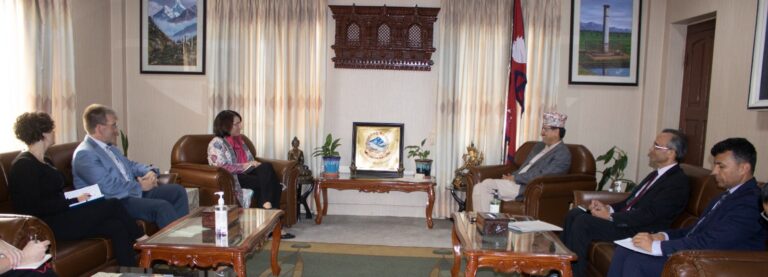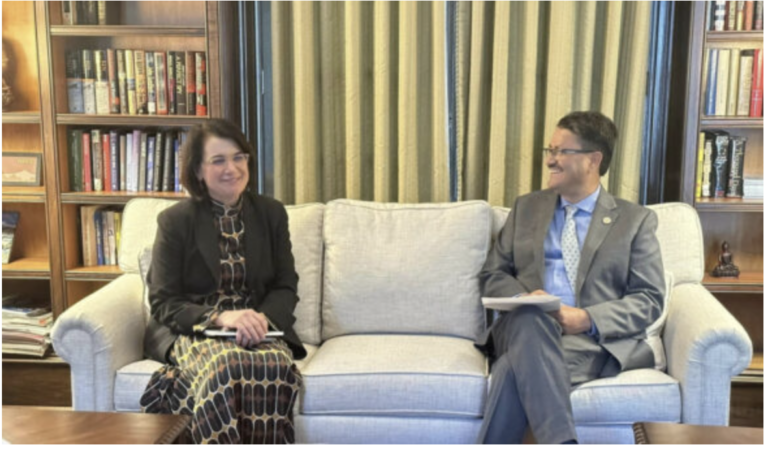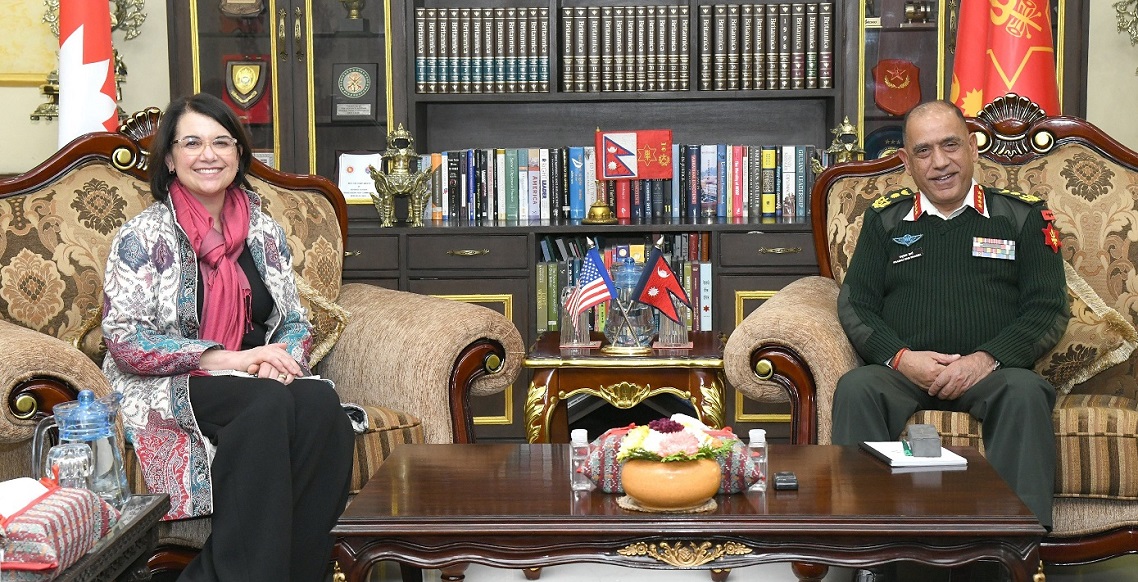Kathmandu. Rear Adm. Eileen Laubacher the senior director of the National Security Council for South Asia in the United States, arrived in Nepal on Wednesday for high-level discussions. During her two-day visit, Rear Admiral Laubacher will meet with senior Nepalese officials, including security officers.

In the course of her two-day tour in Nepal, Laubacher, who serves as the senior director of the National Security Council for South Asia in the United States, will engage in discussions with high-ranking Nepalese officials, along with security officers. Last month, Laubacher had a meeting with Nepal’s Minister of Foreign Affairs, S.P. Saud in Nepal Embassay, Washignton.
AMC Project in Limbo
The Millennium Challenge Corporation (MCC), an American project, has decided to cancel the contract for the construction of transmission lines under the project. According to a press release issued by MCA-Nepal in late October, the proposed cost for the construction of transmission lines, as per the bid submitted, was higher than expected. Despite the international tender for the construction of a transmission line with a capacity of approximately 315 kilometers and 400 kV, the role of the MCC headquarters in the United States remained crucial in canceling the contract.

More than 67% of the proposed amount was deemed excessive, leading to the cancellation of the contract, as reported in the board meeting discussion based on the decision made. The MCC-Nepal had reported to the MCC headquarters in Washington D.C. on this matter during Rear Admiral Laubacher’s visit last month.
The project, aims to construct transmission lines in three phases, covering Lapshiphedi-Ratamate-New Hetuda (117 kilometers), Ratamate-New Dumre Sub-station (90 kilometers), and New Dumre-New Butwal up to the Indian border (108 kilometers), has faced uncertainty as MCC-Nepal has not yet issued a new tender for the construction of transmission lines, even after two months.
Pressure has been mounting to complete the MCC project within five years after the agreement was reached six years ago. Nepal is expected to spend the $500 million grant provided by the United States through the MCC on its own in the development of the energy and transportation sectors.
As per the MCC agreement, the chairman of the MCC’s board meeting is the Secretary of State. However, due to the confusion arising from the cancellation of the tender, the MCC’s board meeting has not been held for the past two months. Without a decision from the board meeting, a new tender cannot be issued for the construction of the transmission line project.
The Ministry of Finance is silent!
There is intense rivalry between the Ministry of Finance and the MCC in the implementation of the Millennium Challenge Corporation (MCC) in Nepal. The MCC Nepal administration accuses the Ministry of obstructing their work, while the Ministry claims that the MCC headquarters only reports to them. The Chief Executive Officer (CEO) of MCC Nepal, Khadga Bahadur Bista, and the officials of the Ministry of Finance are reportedly more annoyed with each other. This has led to the inability to convene board meetings. MCC Nepal has not provided detailed information on this matter to the Finance Secretary.

In a situation where the Finance Secretary is dissatisfied with the working style of MCC, how the board meetings will be conducted is uncertain. According to the officials of the Ministry of Finance, MCC Nepal has not coordinated with the government on matters related to tenders and procurement. The pressure has increased significantly from the United States through high-level visits alone. The Finance Ministry’s response to potential problems in the implementation remains unclear. The official suggests that for the overall coordination, leadership change in MCC Nepal may be necessary.
Why MCC Nepal has not called a board meeting on the matter of re-initiating the global tender is a question. In response to this question, CEO Bista raised new questions and suggested that similar issues may arise again after canceling the contract. The official also mentioned that internal studies are being conducted, and adequate preparation is necessary for the upcoming tender. There is pressure to keep the estimated cost of the new tender within bounds. Environmental criteria have been considered, and design modifications are also being discussed.
By rectifying errors in the design and maintaining strict environmental criteria, the cost of the tender can increase by more than 66%. Therefore, the documents related to the tender are being studied for revision. MCC Nepal has informed about the plan to re-initiate the global tender in a concise resolution submitted to the Ministry of Finance for detailed reporting. Analysts specializing in Indo-Pacific strategy at the American Enterprise Institute state that MCC’s credibility in the project of the Millennium Challenge Account has been eroded. They question how MCC can gain the trust of the competent authority when working with various ministries, including the Ministry of Energy, Physical Infrastructure, and the Electricity Authority, under the leadership of CEO Bista.
The current situation shows that only the Finance Secretary is upset on the MCC board. While working, the Ministry of Energy, the Ministry of Physical Infrastructure, the Ministry of Electricity, and the private sector have all cooperated with CEO Bista. The reason is that the MCC headquarters cannot go beyond the roadmap provided by the Nepal office. Despite being the same in every organization, MCC projects may be in crisis. Therefore, it is natural to discuss the issue of leadership between the Nepali government and MCC for mutual trust.
Continuous speculation
An agreement was reached between MCC and the Government of Nepal on Bhadra 29, 2074 BS. After political disputes arose in Nepal, the agreement, including explanatory statements, was passed by the Parliament on Falgun 15 of the following year.
After that, this project came into operation, and the Millennium Challenge Challenge Account Nepal ( MCC ) Executive Committee ( Board ) meeting could not make a concrete decision. If the contract is canceled, it is stuck in a crisis without making a solid decision. Now, MCC Nepal has not been able to make a solid work schedule so far.
The strategic game continues
On Janauary, the Nepalese government halted the visit of William Joseph Burns, the Director of the American intelligence agency CIA, to Nepal after granting permission. The schedule for Burns’ visit to Nepal was stopped by the Nepalese government ten months after denying permission for the visit.
Amidst heated debates on the implementation of the Millennium Challenge Corporation (MCC) project in Nepal, CIA Chief Burns, along with 24 American military and security officers, was set to arrive in Nepal on a C-17 Globemaster-3 charter plane.
Preparations were underway for Burns’ landing at Tribhuvan International Airport on that date. However, after the Ministry of Foreign Affairs did not grant permission for Burns to enter Nepal, the preparations for landing two additional C-17 Globemaster-3 planes at Kathmandu Airport were also halted.
After the information about the CIA’s Chief plan to visit Nepal was leaked, the Chinese side pressured the Nepalese government to halt the visit due to the pressure exerted on the Government. In response to the report, the CIA Director canceled his immediate visit, and the visit was postponed for at least 10 months.
A Political analyst says that the recent visit of American officials, including Michael Sipher, Assistant Administrator for Asia at the United States Agency for International Development (USAID), who is currently visiting Nepal, and previously, various visits by American officials such as Deputy Minister of Political Affairs Victoria Nuland, USAID Chief Administrator Samantha Power, and Deputy Assistant Secretary of State for South and Central Asian Affairs Afreen Akhtar, or American Senator Chris Bhan Hoolen and other senators during the same period, highlight the growing interest of the United States in Nepal.
Most of the visits by American officials focus on political, diplomatic, and economic assistance matters. analyst says that even the current visit by Director Burns should be understood as American diplomacy in Nepal. These visits are regular and ongoing according to the current situation.
Concerns about the future of the project
Christmas and New Year celebrations in America start from the second Saturday of December. Therefore, American officials have been pressuring the MCC to expedite the necessary clearance process before Christmas. If the coordination between the Ministry of Finance and the MCC Nepal is not established, it may not be possible to convene a board meeting.
According to an official of the Ministry of Finance, there is concern about the future of the project. Officials of the Ministry of Finance, contrary to the agreement in the board meeting held in September, have informed that the agreement with the MCC Nepal has been canceled unilaterally on September 25. After the cancellation of the contract, tension increased, and the MCC management presented detailed opinions and alternatives regarding the problems and solutions to the board. However, the decision of the MCC Nepal to cancel the contract was taken unilaterally without consulting the Ministry of Finance.
The working relationship between the Ministry of Finance and the MCC Nepal seems to be unsatisfactory. Finance Minister Dr.Prakash Sharan Mahat and Board Chairman Krishna Hari Puskar, who were in Morocco during the MCC’s officals visit to Nepal, had demanded an answer from the CEO of the MCC, Khadga Bahadur Bista. After that, the board meeting has not been held.
American officials are dissatisfied with the lack of coordination between the Ministry of Finance and the MCC Nepal. Michael Sipher and senior director Labucher of the National Security Council for South Asia have expressed their dissatisfaction with the lack of coordination during their visit to Nepal.




COMMENTS